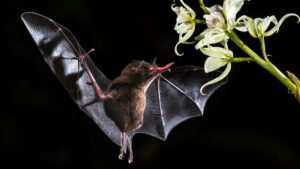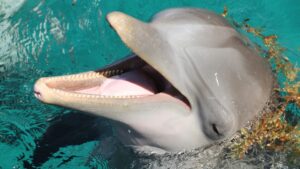Dolphins have long captivated human imagination with their playful behavior, sociable nature, and remarkable intelligence. Often referred to as the “geniuses of the sea,” dolphins exhibit a range of cognitive abilities that not only parallel those of humans and other highly intelligent animals but also offer unique insights into the world of animal cognition. Take a closer look at the intelligence of dolphins, exploring their problem-solving skills, self-awareness, tool use, and how their intellectual prowess compares to that of other “smart” members of the animal kingdom.
Dolphins: The cognitive powerhouse of the seas
Dolphins belong to the family of cetaceans, which also includes whales and porpoises. Among them, dolphins are renowned for their extraordinary brains. In fact, the brain-to-body ratio of some dolphin species is second only to humans, a key indicator of intelligence in the animal kingdom. But what makes dolphins truly stand out is how they utilize this remarkable brainpower.
Problem-solving prowess

Dolphins display remarkable problem-solving skills, a hallmark of intelligence, as detailed by Treehugger. In captivity and the wild, they have been observed using complex strategies to hunt for food. For instance, bottlenose dolphins off the coast of Florida have been seen using marine sponges as tools to protect their snouts while foraging on the seafloor, a behavior known as “sponging.” This demonstrates their ability to use tools while highlighting their capacity for cultural transmission, as this behavior is passed down from mother to calf.
A mirror to their minds: Self-awareness in dolphins
One of the most compelling pieces of evidence for dolphin intelligence is their demonstrated self-awareness. This is most famously tested through the mirror test, where animals are presented with a mirror and observed to see if they can recognize themselves. Dolphins are among the few species that have passed this test, indicating a level of self-awareness comparable to that of great apes and humans. They have been observed inspecting themselves in mirrors, using them to explore parts of their bodies they can’t normally see, like the inside of their mouths or the tips of their fins.
The symphony of dolphin communication
Communication is another domain where dolphins exhibit exceptional intelligence. They use a complex array of clicks, whistles, and body language to communicate with each other. Each dolphin has a unique signature whistle that functions somewhat like a name, allowing them to call out to others specifically. This sophisticated use of sound not only facilitates their social interactions but also plays a crucial role in hunting, as they use echolocation to locate prey.
Emotional intelligence and social complexity
Dolphins live in highly social groups known as pods, which can consist of hundreds of individuals. Within these pods, they form close bonds and exhibit behaviors indicative of empathy, cooperation, and altruism. For example, dolphins have been observed supporting sick or injured members of their group, helping them to breathe by bringing them to the surface. Such behaviors suggest a level of emotional intelligence that is rare in the animal kingdom.
Comparing dolphin intelligence to other animals
When it comes to intelligence, dolphins are often compared to other “smart” animals, such as great apes, elephants, and even humans. Like these species, dolphins possess a complex neocortex, the part of the brain responsible for higher-order functions like reasoning, problem-solving, and self-awareness. However, the aquatic environment in which dolphins have evolved has led them to develop cognitive abilities that are both similar to and distinct from their terrestrial counterparts.
For instance, while great apes use tools and exhibit complex social structures, dolphins have adapted their intelligence to master the marine environment, developing sophisticated hunting techniques and communication systems that are unparalleled in the terrestrial world. This highlights the importance of considering the ecological context when evaluating animal intelligence.
What dolphin intelligence reveals about animal cognition
The study of dolphin intelligence is not just about understanding dolphins — it offers broader insights into the nature of intelligence and consciousness in the animal kingdom. Dolphins challenge our human-centric view of intelligence, showing that complex cognitive abilities can evolve in a variety of forms and environments.
Moreover, the intelligence of dolphins raises important ethical considerations about how humans interact with other intelligent species. Recognizing the complex inner lives of dolphins has led to increased calls for their protection and has sparked debates about captivity and conservation.
Dolphins are remarkably smart
The intelligence of dolphins is a testament to the wonders of evolution and the complexity of the animal mind. Their problem-solving abilities, self-awareness, use of tools, and sophisticated social structures make them fascinating subjects of study. These traits also remind us of the interconnectedness of all intelligent life. As we continue to explore the depths of dolphin cognition, we may find that these remarkably smart creatures have even more to teach us about the mysteries of the mind, the nature of intelligence, and our place in the natural world.
In the end, understanding dolphin intelligence is not just an academic pursuit — it’s a journey into the depths of cognitive evolution, offering glimpses of the potential that lies within the minds of all creatures, including our own. The more we learn about dolphins, the more we realize that the boundaries of intelligence and consciousness are far broader and more inclusive than we once thought. So, let us continue to dive deep into the study of dolphin intelligence, for in the depths of their minds, we may find reflections of our own.
RELATED: Orca Whales Are Attacking Boats for a Unique Reason, Theorize Researchers
Header image: Bottlenose dolphin | Darin Ashby via Unsplash
I’m Mark Putzer, and my passion for animals and all things nature is a life-long love affair. Growing up in Wisconsin, I had many cherished memories of hiking, skiing, and enjoying the abundant wildlife in the Badger State.
My passion for animals led me to marine biology research for my studies at the University of Wisconsin. I researched the behavior and communication of humpback whales around Hawaii and Orca Whales around the San Juan Islands of Washington State. The experience of being close to these massive and magnificent creatures is amazing. Later, I taught outdoor education to children in California — passing along my knowledge of animals and nature to the curious minds of the next generation. I also love pets. This includes a Labrador Retriever dog named “Molly” when I was a kid — and now, an adventurous tabby cat named “Rosy.”
I’m here to share the wonders of the animal kingdom with you. Whether it’s a cherished pet at home or an animal out in the wild, there are many unique stories and interesting information to share on Weird Animal News! Enjoy!





















